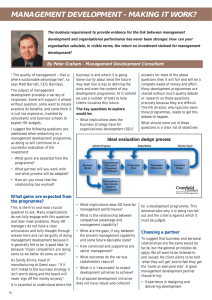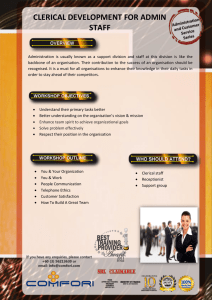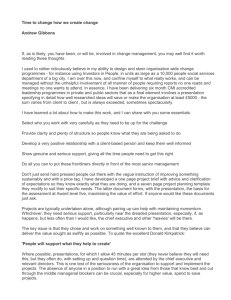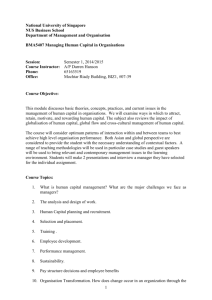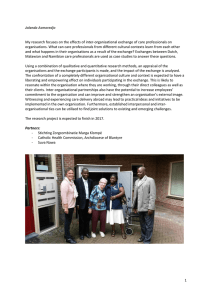Interview: Bill Shedden Executive Development Journeys
advertisement
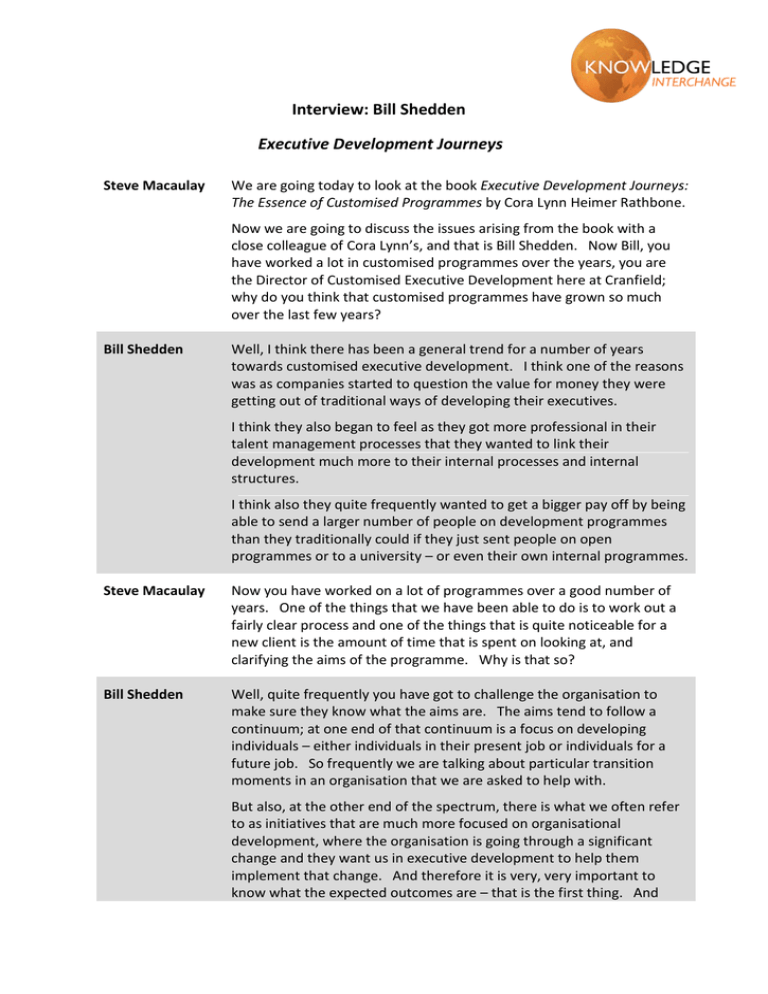
Interview: Bill Shedden Executive Development Journeys Steve Macaulay We are going today to look at the book Executive Development Journeys: The Essence of Customised Programmes by Cora Lynn Heimer Rathbone. Now we are going to discuss the issues arising from the book with a close colleague of Cora Lynn’s, and that is Bill Shedden. Now Bill, you have worked a lot in customised programmes over the years, you are the Director of Customised Executive Development here at Cranfield; why do you think that customised programmes have grown so much over the last few years? Bill Shedden Well, I think there has been a general trend for a number of years towards customised executive development. I think one of the reasons was as companies started to question the value for money they were getting out of traditional ways of developing their executives. I think they also began to feel as they got more professional in their talent management processes that they wanted to link their development much more to their internal processes and internal structures. I think also they quite frequently wanted to get a bigger pay off by being able to send a larger number of people on development programmes than they traditionally could if they just sent people on open programmes or to a university – or even their own internal programmes. Steve Macaulay Now you have worked on a lot of programmes over a good number of years. One of the things that we have been able to do is to work out a fairly clear process and one of the things that is quite noticeable for a new client is the amount of time that is spent on looking at, and clarifying the aims of the programme. Why is that so? Bill Shedden Well, quite frequently you have got to challenge the organisation to make sure they know what the aims are. The aims tend to follow a continuum; at one end of that continuum is a focus on developing individuals – either individuals in their present job or individuals for a future job. So frequently we are talking about particular transition moments in an organisation that we are asked to help with. But also, at the other end of the spectrum, there is what we often refer to as initiatives that are much more focused on organisational development, where the organisation is going through a significant change and they want us in executive development to help them implement that change. And therefore it is very, very important to know what the expected outcomes are – that is the first thing. And Bill Shedden secondly, it is very important to know what the context is. So it is very important for us to be aware of the cultural context – both from a national, if we are doing work in various countries, and an organisational point of view. And even sometimes a departmental point of view. So that is critical. It is also important for us to be able to challenge the organisation. Sometimes there is no doubt you get a briefing from a particular group of people in an organisation that, let us say, doesn’t necessarily match what other people in the organisation feel is required. So it is very important to clarify all those issues before we go ahead and it is also important to clarify that there is a relationship that can be developed between the organisation and the provider – in this case obviously, Cranfield. And that takes some time to develop and a high degree of professionalism, because after all the organisation is usually spending quite a lot of money on this intervention and therefore the critical thing is to get it right. Therefore we often say that the difficult part of the job is setting up the programme. We usually think we can deliver programmes pretty well, but making sure we are delivering the right stuff in the right place in the right way is often what is more critical. Steve Macaulay One of the things that surprises some people is the number of people involved in delivering a good programme. One of the things that people would often say is well, all I need is a few faculty and they deliver to the client. But in fact there is quite a linked partnership relationship, isn’t there? Bill Shedden There is, and I think not only do we pride ourselves on that, but I think that has stood us in very good stead over the last five years. The critical part of that relationship is the role of our Executive Development Director who has to be able to meet the needs of the organisation as I described earlier. But part of that role of the Executive Development Director is to act as the representative of the organisation within Cranfield; so to ensure that we get the right faculty, faculty that have the right expertise, faculty that we feel will match the culture of that organisation. So that is important. It is also important for us to be able to develop in a very professional way the logistics and organisational side of the programme. For instance, more and more of our programmes are run away from Cranfield. That may put quite a strain on the organisational and management side. Quite frequently organisations don’t have that back up anymore; so that we have to take on that logistics role. So we have an Executive Development Director, a Client Project Manager and we have a range of faculty that we can involve in that. In addition to that, and we might talk about this later, we are expected now to provide a much wider range of services and www.cranfieldknowledgeinterchange.com Page 2 Bill Shedden therefore we need people who are skilled in a wider range of areas other than just delivering in a classroom on a programme. Steve Macaulay Well let’s talk about that because I guess most people would think faculty come into a lecture and deliver, but certainly with incompany work that is not the case at all, is it? Bill Shedden No, clearly faculty – the best faculty – have that ability to deliver their expertise which will add to knowledge within the organisation, but the critical part is setting up a process that enables people to work with that expertise on their own problems. So the style is very different, full stop. And more and more we are being asked to match what we do to the other talent management processes within the organisation. So for instance, we will be asked to run development centres or psychometric work to establish where a particular individual stands within his role in the organisation. And we have to develop the skills of giving feedback in that area; so we have a psychometrics service, we have a range of people who can give feedback – that is a very skilled job – and can do that in a confidential and developmental way with individuals. We are also expected more and more to deliver internationally. So we have a little strap line that says one of our aims is to make location irrelevant which we can deliver and we give as back up much more emphasis to networked learning ie, online learning. So there is a whole range of different processes that we are asked to deliver on which certainly weren’t done traditionally and most of them weren’t done even three or four years ago. Steve Macaulay You mentioned that, rightly, companies are very concerned that they have made a big investment now they want some return for that and I know that is high on our agenda, as well as theirs – in theory it should be pretty easy shouldn’t it? Is it so in practice? Bill Shedden Well it is the $64,000 question; and no it isn’t easy in practice because our return on investment can be completely overshadowed by some other economic activity that either makes the organisation less profitable than it was, or less turnover than it was – and we have had examples of that over the recessionary period. We could argue our programme was successful, but the organisation wasn’t. But nevertheless, you are absolutely right, there are things we do. So if we are focusing on a programme to develop individuals for the next challenges in management, then at a minimum we have to be able to demonstrate to the senior management team that we are delivering that. So they should, with us, be looking at have we got www.cranfieldknowledgeinterchange.com Page 3 Bill Shedden a cadre of people who are now suitable for promotion. So that is a major requirement. We also do, once we have established a programme and worked through what it is we are supposed to be doing in term of competency development, then we can check whether we have indeed developed those competencies. So that is a kind of ROI. More practically, quite frequently, a lot of the work often depends on action learning, working on projects, and with our help organisations can actually establish whether things are implemented, what the organisational increase in revenue or decrease in costs are and we pay quite a lot of attention to that. Quite legitimately organisations have a right to ask us that. Quite frequently, in fact more and more now, we are being asked to work with organisations in non traditional ways. We did have a client earlier this year where our client really wants us to support and help senior directors implement strategic projects. Our development was done through that. If you are doing that then you can see what pay off is – you can practically see what the payoff is. More and more we are being asked to work with organisations on what they often refer to as the 70/20/10 approach to talent management, which is 70% of management and development is done on the job, 20% is mentoring and coaching and 10% by formal interventions. We more and more are working in areas other than just that 10%; because of the services we provide we are at a minimum operating in the 20% area as well and also helping organisations develop people on the job. So I think we are trying to move much more, we try to see development much more as a holistic activity rather than something people just come and have an injection of and then go back to the organisation. Steve Macaulay Bill that is some useful insights, thank you very much. www.cranfieldknowledgeinterchange.com Page 4

